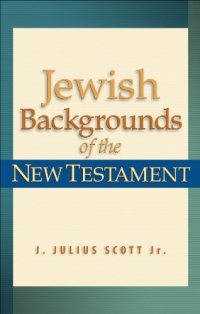
Ebook: Jewish Backgrounds of the New Testament
Author: J. Julius Scott Jr.
- Genre: Religion
- Tags: Bible Study, New Testament, Old Testament, Guides, Bible Study & Reference, Theology, Angelology & Demonology, Anthropology, Apologetics, Catholic, Christology, Creationism, Ecclesiology, Ecumenism, Eschatology, Ethics, Fundamentalism, Gnosticism, Historical, Liberation, Mysticism, Pneumatology, Process, Prophecy, Protestant, Salvation Theory, Systematic, Ancient Civilizations, Assyria Babylonia & Sumer, Aztec, Egypt, Greece, Incan, Mayan, Mesopotamia, Prehistory, Rome, History, Judaism, Religious, World, History, History, Judaism, Relig
- Year: 2012
- Publisher: Baker Academic
- Language: English
- pdf
This is an excellent book on the subject of judaism in the period between the OT and the NT.
Dr. Julius Scott covers a lot of ground regarding religious beliefs and how they changed over time.
There were different branches of judaism with similarities as well as differences.The author also details some contrasts between Samaritans,Pharisees,and Sadducees.
There is some helpful information on the Septuagint,it's source,and difference of translation between the hebrew OT and the greek OT.
Dr.Scott looks at Josephus and Philo and the value of their writings in the study of intertestamental judaism,with some understandable scepticism of Josephus.
He also details the priesthood and rivalry between families-Zadokites and Tobiads.The pollution of the priesthood is also discussed.
He covers the start of rabbinical judaism and the circumstances that led to the percieved need for oral law/tradition as a hedge around Torah.
There was some interesting information about Simon bar Kosiba(Kochba).
There is an "Intertestamental Calendar and Festivals Table" that is an excellent resource about the Biblical feasts.This period also saw the addition and alteration of some OT feasts.
The use of the sacred name is discussed.
"The Talmud and other rabbinical sources indicate that by the time of Simon the Just(c.200BC)the divine name was no longer pronounced,except by the high priest on Yom Kippur".
He also had an interesting perspective on the sabbatical and Jubilee years.
"The sabbatical year,occuring every seventh year and the Jubilee,every fiftieth year,prevented the accumulation of too much wealth and oppression of the poor".
There is a very good list of general sources,frequent footnotes and quotes.
I found a few minor points that I think are debatable in the book.That doesn't lessen the value of the author's work.
While not as comprehensive as Edersheim's "The Life and Times of Jesus the Messiah", this book is a good choice for anyone interested in the diverse beliefs and Messianic expectations of the period.
Dr. Julius Scott covers a lot of ground regarding religious beliefs and how they changed over time.
There were different branches of judaism with similarities as well as differences.The author also details some contrasts between Samaritans,Pharisees,and Sadducees.
There is some helpful information on the Septuagint,it's source,and difference of translation between the hebrew OT and the greek OT.
Dr.Scott looks at Josephus and Philo and the value of their writings in the study of intertestamental judaism,with some understandable scepticism of Josephus.
He also details the priesthood and rivalry between families-Zadokites and Tobiads.The pollution of the priesthood is also discussed.
He covers the start of rabbinical judaism and the circumstances that led to the percieved need for oral law/tradition as a hedge around Torah.
There was some interesting information about Simon bar Kosiba(Kochba).
There is an "Intertestamental Calendar and Festivals Table" that is an excellent resource about the Biblical feasts.This period also saw the addition and alteration of some OT feasts.
The use of the sacred name is discussed.
"The Talmud and other rabbinical sources indicate that by the time of Simon the Just(c.200BC)the divine name was no longer pronounced,except by the high priest on Yom Kippur".
He also had an interesting perspective on the sabbatical and Jubilee years.
"The sabbatical year,occuring every seventh year and the Jubilee,every fiftieth year,prevented the accumulation of too much wealth and oppression of the poor".
There is a very good list of general sources,frequent footnotes and quotes.
I found a few minor points that I think are debatable in the book.That doesn't lessen the value of the author's work.
While not as comprehensive as Edersheim's "The Life and Times of Jesus the Messiah", this book is a good choice for anyone interested in the diverse beliefs and Messianic expectations of the period.
Download the book Jewish Backgrounds of the New Testament for free or read online
Continue reading on any device:

Last viewed books
Related books
{related-news}
Comments (0)